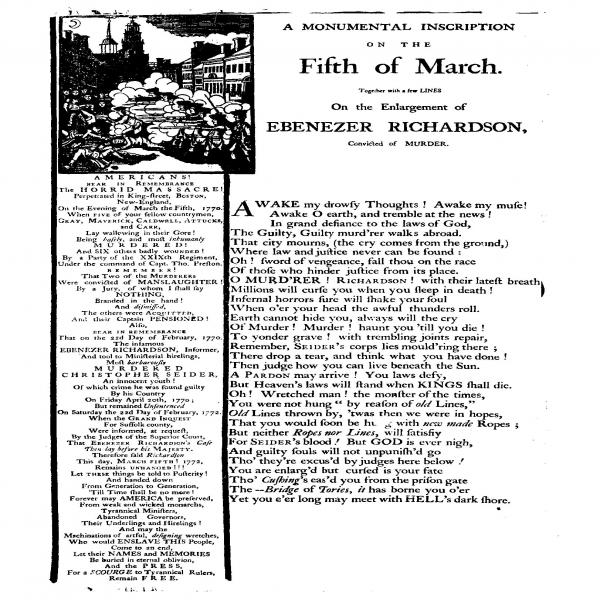Monumental Inscription on the Fifth of March
Original

Background Notes
The document goes on to say how Captain Thomas Preston’s soldiers had attached the men maliciously and how they were “branded in the hand and dismissed”. The brand was a small m, which was burned into their thumb, so that when they were not wearing gloves, all would know they were guilty of manslaughter. 1
The language is strong against the King’s Troops and of the way the trial was conducted and how they felt the punishment wasn’t severe enough. In the ballad, the lines say:
“A pardon may arrive, you laws defy
But heaven’s laws will stand
When Kings Shall die”
This reminds the readers that even those who may currently rule are still under the watchful eye of God, and that he is the ultimate judge and redeemer. The wood carving, by Paul Revere, has always been controversial. There are some who say that Revere actually did not witness the attack, but had first hand knowledge of the event. But the painful fact must be recorded that Revere is under grave suspicion of having in this instance appropriated the work of another. The basis of this charge is the following letter written to Revere by Henry Pelham, a contemporary engraver and miniaturist. Paul Revere was an ardent patriot, and one of the most useful Americans of his day, and besides was an excellent mechanic; but history does not show him to have been an artist, and in several instances it does show that he made use of the artistic talents of others. Mr. Pelham states in his letter:
“SIR: "BOSTON, March 29, 1770."
When I heard that you was cutting a plate of the late Murder, I thought it impossible
as I knew you was not capable of doing it unless you coppied it from mine
and as I thought I had intrusted it in the hands of a person who had more regard to
the dictates of Honour and Justice than to take the undue advantage you have done
of the confidence and trust I reposed in you. But I find I was mistaken and after
being at great Trouble and Expence of making a design, paying for paper, printing
&c., find myself in the most ungenerous Manner deprived not only of any
proposed Advantage but even of the expence I have been at as truly as if you
had plundered me on the highway. If you are insensible of the Dishonour you have
brought on yourself by this Act, the World will not be so. However, I leave you to
reflect and consider of one of the most dishonourable Actions you could well be
guilty of. "
H. Pelham."2
If you look closely at the cutting, the troops are in formation, muskets are out and shooting straight into the crowd, with Captain Preston to the far right with his sword raised with the signal to fire.
The colonists are cowering in the background, the wounded and dead lay helpless at the soldiers’ feet. This would cut was used as evidence in the trial that followed this attack and it is said that this event was what created the spark for the American Revolution.
-
Peter King, Crime, Justice and Discretion in England, 740-1820 (Oxford, 2000), chapters 8-10
-
Charles Ferris Gettemy, The True Story of Paul Revere, His Midnight Ride, His Arrest and Court-Martial & His Useful Public Services (Boston: Little, Brown and Company, 1905)